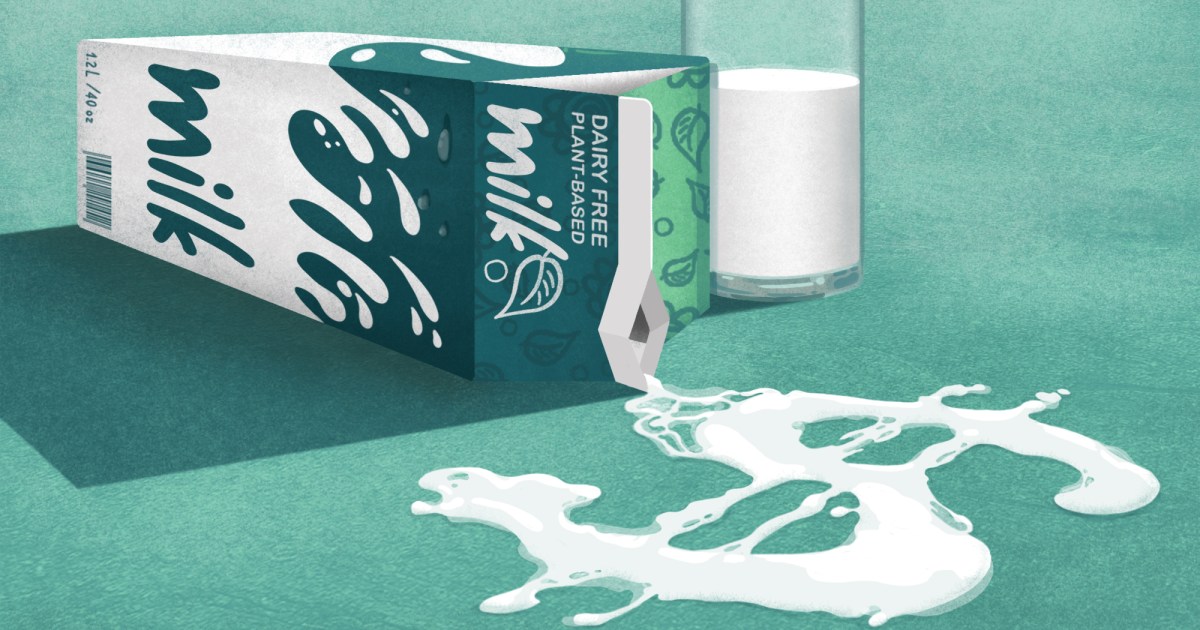Like an estimated two-thirds of the world’s population, I don’t digest lactose well, which makes the occasional latte an especially pricey proposition. So it was a pleasant surprise when, shortly after moving to San Francisco, I ordered a drink at Blue Bottle Coffee and didn’t have to ask—or pay extra—for a milk alternative. Since 2022, the once Oakland-based, now Nestlé-owned cafe chain has defaulted to oat milk, both to cut carbon emissions and because lots of its affluent-tending customers were already choosing it as their go-to.
Plant-based milks, a multibillion-dollar global market, aren’t just good for the lactose intolerant: They’re also better for the climate. Dairy cows belch a lot of methane, a greenhouse gas 25 times more potent than carbon dioxide; they contribute at least 7 percent of US methane output, the equivalent emissions of 10 million cars. Cattle need a lot of room to graze, too: Plant-based milks use about a tenth as much land to produce the same quantity of milk. And it takes almost a thousand gallons of water to manufacture a gallon of dairy milk—four times the water cost of alt-milk from oats or soy.
But if climate concerns push us toward the alt-milk aisle, dairy still has price on its side. Even though plant-based milks are generally much less resource-intensive, they’re often more expensive. Walk into any Starbucks, and you’ll likely pay around 70 cents extra for nondairy options.
. Dairy’s affordability edge, explains María Mascaraque, an analyst at market research firm Euromonitor International, relies on the industry’s ability to produce “at larger volumes, which drives down the cost per carton.” American demand for milk alternatives, though expected to grow by 10 percent a year through 2030, can’t beat those economies of scale. (Globally, alt-milks aren’t new on the scene—coconut milk is even mentioned in the Sanskrit epic Mahābhārata, which is thousands of years old.)
What else contributes to cow milk’s dominance? Dairy farmers are “political favorites,” says Daniel Sumner, a University of California, Davis, agricultural economist. In addition to support like the “Dairy Checkoff,” a joint government-industry program to promote milk products (including the “Got Milk?” campaign), they’ve long raked in direct subsidies currently worth around $1 billion a year.
Big Milk fights hard to maintain those benefits, spending more than $7 million a year on lobbying. That might help explain why the US Department of Agriculture has talked around the climate virtues of meat and dairy alternatives, refusing to factor sustainability into its dietary guidelines—and why it has featured content, such as a 2013 article by then–Agriculture Secretary Tom Vilsack, trumpeting the dairy industry as “leading the way in sustainable innovation.”
But the USDA doesn’t directly support plant-based milk. It does subsidize some alt-milk ingredients—soybean producers, like dairy, net close to $1 billion a year on average, but that crop largely goes to feeding meat- and dairy-producing livestock and extracting oil. A 2021 report by industry analysts Mintec Limited and Frost Procurement Adventurer also notes that, while the inputs for dairy (such as cattle feed) for dairy are a little more expensive than typical plant-milk ingredients, plant alternatives face higher manufacturing costs. Alt-milk makers, Sumner says, may also have thinner profit margins: Their “strategy for growth is advertisement and promotion and publicity,” which isn’t cheap.
Starbucks, though, does benefit from economies of scale. In Europe, the company is slowly dropping premiums for alt-milks, a move it attributes to wanting to lower corporate emissions. “Market-level conditions allow us to move more quickly” than other companies, a spokesperson for the coffee giant told me, but didn’t say if or when the price drop would happen elsewhere.
In the United States, meanwhile, it’s a waiting game to see whether the government or corporations drive down alt-milk costs. Currently, Sumner says, plant-based milk producers operate under an assumption that “price isn’t the main thing” for their buyers—as long as enough privileged consumers will pay up, alt-milk can fill a premium niche. But it’s going to take a bigger market than that to make real progress in curbing emissions from food.
Are there actual studies showing that plant-based alternatives are better for health (on individuals that digest lactose just fine like me) ?
I switched to alt-milks for ecological reason but media keep talking about the negative health effects of «ultra-transformed food», which alt-milk very much sounds like…
What’s more local, whatever is more local is likely better for the planet unless that UK oat milk in that Toronto Coffee shop flew there on its own.
It it doesn’t come from a mammal it ain’t milk.
Good question. For some dumb reason, we keep telling kids to drink milk, too, as well as try to get them to drink it in schools, when we should be doing anything BUT that. We should be telling them to cut dairy to as close to zero as possible.
It’s still part of the food pyramid is it not? WTAF.
We don’t need non human milk in the first place so I don’t need a milk alternative either lol
Also, for the record I’m mostly off human milk too now that I’m an adult
Mostly? You still breastfeeding as an adult?
Not all the time. I’m not a weirdo
The stuff in the carton at the store is cows milk. Not human.
Woooosh
We also don’t need couches, or entertainment. Stop ruining tasty milk :(
Also, for the record I’m mostly off human milk too now that I’m an adult
Don’t worry, babysteps (no pun intended) for the win, you can do it!
mostly
ಠ_ಠ
As for the answer to the question…
Cuz mhn milk gud
Because it’s a relatively new competitor on the market that doesn’t have the same agricultural base as dairy products which warrants subsidies aimed at keeping farmers from losing their shirts during lean seasons?
I agree with cutting off subsidies, but for people calling stopping production, it clearly just doesn’t taste the same.
Those people prioritize reducing the suffering the dairy industry causes over that taste people like.
No but that not the same isn’t an uncanny valley kinda not the same. It’s still a milk product because it’s meant to be able to be used the same way, but it’s still its own thing.
Yeah, just for me I like the taste of normal milk, and haven’t really found milk substitutes that I like the taste of.
We could always, ya know, stop exploiting and slaughtering animals?
Why?
Do you really need an explanation of why it’s good and moral to reduce suffering of sentient animals?
Gophers are also sentient, doesnt stop me from gassing the bastards.
I do. it’s nonobvious. in fact, I’d say most ethical systems dont consider it at all.
Yes, more specifically where you would think it starts? What level of complexity of brain?
I can’t make milk kefir with almond milk
This is a weird advertisement. Drink water. Plant milk does not have the protein or calorie density as dairy milk. You may as well drink water and eat your greens instead of supporting industries that are gentle rapists of the earth. I’ll drink my own vomit before reading that rag again.
Because cow milk is awesome and we need more cows.
Because most plant juice tastes like shit and has the wrong mouth-feel for most things we use cow milk for. Its not rocket surgery.
deleted by creator
Well, dairy takes more.
Calm down Chidi…
How did the man not die from starvation?
You have to grow the feed for cows, give them water, and cows emit significant greenhouse gasses.
Almond trees use way less water and actively reduce CO2 during growth.
If this hits market, I’ll be all for it.
I’m not vegan or even vegetarian, so I feel pretty impartial on this. My partner uses oat milk for their coffee, and over the years I just got used to using it straight, or in cereals, etc. Now I greatly prefer it. It’s just “milk” for me now.
Never thought it would happen, but getting cow milk when I’m out feels off - that mouth-feel you mention; just doesn’t sit right anymore. It really is an acquired taste.
Right there with you. I’ve been living the plant milk life for years at this point and cow milk just tastes so… water-y for lack of a better explanation.
My wife says she can “taste the cow” in the milk, in the same way she could “taste the goat” in goat milk before moving to plant based milks.
I know exactly what she means though, it’s a weird aftertaste that tastes ‘wild’ in the same way you can differentiate wild game from beef or pork.
However, it seems only people who have been off cow milk for a while can identify this element.
Yeah! That’s the perfect way to put it, thank you. It’s like a foreign extra flavour - a certain cowiness that I didn’t notice growing up. Cow milk used to taste like “default milk,” where everything else was a variation on that normal base. But now it’s one of the “other” milks, because I taste it so infrequently.
Have you considered heavy cream? /s
Seems like it is because the answer isn’t what you said.
They were giving their own answer, genius.
When you say “It’s not rocket science/surgery” it implies that what you’re saying is an evidence, in this case their answer is false, it’s not subsidized because it tastes better or people enjoy it more, it’s purely political.
Spot on. People are out here trying to play like almond, oat, soy and every other milk substitute is exactly the same as dairy based milk, it’s not and will not ever be, they’re different products
Also pretending that people swapping from dairy to alternate milks will somehow impact the looming climate crisis is also pretty disingenuous
If we all went vegan we’d reduce food based emissions by 70%, which is 15% of the entire planets GHG emissions. Not to mention recovering 75% of farm land.
It really is a no brainer if you want to make a difference. And if I, “a rural New Zealander who grew up on a dairy farm who said he’d never eat a vegetarian meal in his life” can convert to veganism based on the logic of it, surely anyone could.
If we all went vegan we’d reduce food based emissions by 70
I doubt it.
I’m going to use your sound logical deductions and reasoning skills to reply to your comment in kind, ready?
I doubt it
Yeah? Well I doubt THAT.
you can doubt whether i doubt something but i am the authority on whether i doubt something so self-reporting my doubt is the strongest evidence that can be gathered in support of the claim.
a claim made without evidence can be dismissed without evidence. i’ve presented exactly as much evedince as the claim to which i was responding.
Why? Because all the animal herders will still produce lots of meat at a loss and then just burn everything no one wants to eat?
i don’t believe the methodology used to calculate emissions from animal agriculture is appropriate: every examination i’ve done has attributed emissions to animals that are actually conservation, like feeding cattle cottonseed and then attributing the impacts of cotton grown for textiles to cattle.
But then you doubt the number and not the general effect of reducing carbon emissions by switching to a plant-based diet, right? Because it is pretty obvious, that growing plants and then feeding those plants to animals is way more inefficient than eating the plants without extra steps.
a lot of what is fed to animals are parts of plants that people can’t or won’t eat. there may be some reduction but i don’t believe it can be anywhere near 70%
If you see how much crops we need to grow and fresh water we need to feed a cow, you’d see how inefficient meat is.
70% of all the crops we grow is to feed our livestock.
Meaning for 1/3 on our plate, we use more than double the resources than the other 2/3 combined.
70% of all the crops we grow is to feed our livestock.
that’s a lie
Do we really need to recover farmland, though? At least in the US, we have way more than enough to go around. And there’s like 19 people in New Zealand, y’all don’t need the space. :P
Or look at the deforestation of the Amazon rainforest. That all done to produce more farmland. So, if we were using or land more efficiently we wouldn’t be carving up the “lungs of the world”
Yeah our rivers in NZ got so polluted with cow effluence and runoff the waters became legally unswimmable. Then the right wing government changed what is legally define as “polluted” so people could swim again.
Farm land (in particular farm land unsuitable for crops) can be used to plant forests, further reducing climate change. If the boomer generation lost 6-10 IQ points on average for leaded petrol, ours will see that again from high PPM CO2 rates.
there is no reason to think farmland would be “recovered” or converted to any less- environmentally destructive use.
Ready for another reply where I used /u/commie’s clever abilities to reply to an argument? Prepare yourself for an amazing analytical response!
“I disagree”
this is poisoning the well
Because it tastes like shit. And I don’t even drink milk but you can’t even cook with the substitute shit.
Oatmilk creamer in coffee or chai, however, is delicious. Some brands are better tasting than others.
Yeah, but store bought is expensive AF. Oatmilk is one of the easiest milks to make at home. Literally get rolled oats, blend them lightly with a blender along with water and strain out the fibre. That’s it… That’s oat milk for you!
Have you actually tried to do this? I did, and it was pretty disappointing.
Yes I did. I loved it quite a lot actually! It weirdly had an absolutely wonderful fragrance to it.
Did you try your homemade oatmilk in coffee?
In tea specifically
In my experience you need to blend an emulsifier (e.g. xanthan) and optionally some oil into the pressed oat milk so it doesn’t separate in coffee.
If you want something closer to the flavor and mouthfeel of heavily processed commercial oat milk, you need to blend in oil, salt, sugar, and an emulsifier (I use xanthan) after filtering out the oat solids.
Oatmilk is pretty close to the real thing without being an all out substitute. I use it for day to day stuff and if I have a recipe that requires milk I buy a small amount versus a whole gallon. Most do just taste like nut juice though.
It’s also 1000x better for the environment. I don’t give a fuck if my brand tastes 87% like milk at that point. I still and will use creams for cooking, but milk and cereal is such a weird industry now that it’s all really expensive.
deleted by creator
I don’t believe you have used the correct plant milks for the correct uses.
- Soya Milk: Kinda meh taste for hot and cold beverages. U won’t go wrong with it. However, this ain’t the best product for all uses. U can make tofu tho, which is nice.
- Oat milk: The best choice for cold beverages. Oat milk has a flavor that is just much better than soy milk in my opinion. While u can use it for hot beverages (and it’s delicious there), u need to be kinda careful. The more u heat up oat milk, the thicker it becomes due to the starch present in it. Therefore, never try to boil, or come close to boiling oat milk ever.
- Coconut milk: If u have anything to say about coconut milk, gtfo from here. It’s fatty and can be a substitute for cream. Needless to say, it is absolutely delicious! South Indian curries make use of this. There’s also a drink that I love called “Solkadhi”, which is an Indian drink made using coconut milk. U just can’t talk smack abt it…
- Chickpea milk: Now this is a use case which I don’t know if many people would agree with me out on or no. What I do is, I make chickpea milk to make youghurt out of it (just ferment it using soaking water). Now, in my experience, this yogurt tastes like shit if u consume it alone. HOWEVER, if you use it in curries, gohdddd r u in for the treat of ur lifetime! One, u get a beautiful thick curry and two, u get that amazing acidic flavor. It’s just rlly rlly good! Highly recommend if u guys haven’t tried this out yet.
- Other plant milks: There are a gazillion other plant milks. I just mentioned the ones above that I have personal experience with.
In conclusion, try not to fixate on one plant milk alternative and then attempt to use it for all use cases of dairy milk. Remember, there is no monolithic “dairy milk alternative”. Different plant milks serve different purposes. If used correctly, u’ll get the best culinary experience of ur life!
Or, you know, I could just use milk.
Well sure… The reason why I don’t use dairy milk is because:
- lactose intolerance
- plant based milk is much better for the environment
- DIY plant based milk is cheap af
- Ethical concerns with the animal husbandry industry
We all just say “capitalism” and end the thread right?
Because the fiction that plant-based products are healthy has been heavily debunked by just how sickly vegans are on average?












